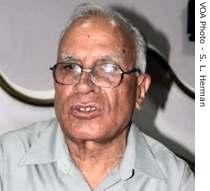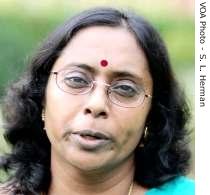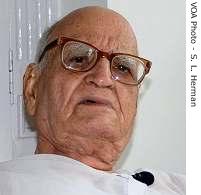2007年VOA标准英语-Pain of Partition Lingers 60 Years After Indepe
搜索关注在线英语听力室公众号:tingroom,领取免费英语资料大礼包。
(单词翻译)
By Steve HermanNew Delhi
14 August 2007
Sixty years ago, India and Pakistan celebrated3 their newly won independence from British colonial rule. Pakistan was created from predominately Muslim regions of British India to create a Muslim homeland, whose two parts sat awkwardly on either side of a largely Hindu India. But independence also brought violence and tragedy. Ten million people were uprooted4 from their homes. Hundreds of thousands died, and women were sexually assaulted and kidnapped, in the upheaval5 that followed. VOA's Steve Herman in New Delhi takes a look at the lingering effects of that partition.
decorative1 lights on the Indian gate, at the joint2 border check post, Wagah, India, 13 Aug 2007" hspace="2" src="http://www.tingroom.com/upimg/allimg/070817/1500260.jpg" width="210" vspace="2" border="0" />
An electrician checks the decorative lights on the Indian gate, at the joint border check post, Wagah, India, 13 Aug 2007
In a museum in New Delhi, an image of independent India's initial hopes springs back to life. A robot of Jawaharlal Nehru, India's first prime minister, accompanies a recording6 of him addressing the Constituent7 Assembly minutes before independence at midnight, August 15, 1947.
"It means the ending of poverty and ignorance and disease and inequality of opportunity. The ambition of the greatest man of our generation has been to wipe every tear from every eye. That may be beyond us, but so long as there are tears and suffering, so long our work will not be over," he said.
Sixty years on, that work is still not over. Hundreds of millions in India, Pakistan, and Bangladesh - which was originally the eastern portion of Pakistan - are impoverished8. And painful memories of the violence that accompanied independence remain.
Partition, the dividing of British India into a new "India" and a predominately Muslim Pakistan, was bitterly debated prior to independence. The debate was finally won by Muhammed Ali Jinnah, the father of Pakistan, who argued that without partition, the Muslim minority would become marginalized, with consequences he called too disastrous9 to imagine.
"We must remember that we have to take momentous10 decisions and handle grave issues facing us in the solution of the complex political problems of this great sub-continent, inhabited by 400 million people," said Jinnah.
When independence came, millions fled across the new borders: Hindus and Sikhs out of West and East Pakistan into India, Muslims in the opposite direction. Hundreds of thousands died cruelly in the rampant11 inter-ethnic violence that accompanied these dual12 migrations13.
Refugees were attacked as they fled. It was not uncommon14 for trains to arrive in one country or the other with all passengers dead. Sometimes, the carriages of these "ghost trains" were still ablaze15 as the trains pulled into the station.
Professor Farooq Ahmad Dar of Quaid-i-Azam University in Islamabad recalls that his mother's family masqueraded as Hindus when their train heading for Pakistan was attacked.
"That family was the only family which could manage to reach Pakistan alive. And that was because of the trick they used. They were protected by the Hindus and the Sikhs, who killed all others," said Dar.
 |
| Pritam Singh Mahna |
"I still remember. Whenever we face 15th August, I start weeping," said Pritam.
Ten generations of Mahnas, a Sikh family, had worked the land in the Punjab. But Pritam's father would be the last.
While preparing to flee, the father convinced neighbors the family had converted to Islam, to keep them all from being massacred.
"Yes, we would have been murdered by the Mohammedans," added Pritam.
Manmohan Madhok, a Hindu, had significant landholdings in what was now Pakistan, some 40 miles north of Lahore. He had hoped to remain with his wife and four children.
"I have sweet memories of that place. But we no longer consider that our home. Our home is India now," he said.
Many of the refugee families would eventually flourish in India, although Pritam Singh Mahna's family had to spend a decade as refugees here living in wooden huts. But they were lucky to be alive.
India and Pakistan have fought each other three times since independence, and the territory that prompted two wars, Kashmir, remains16 disputed. The third war, in 1971, saw East Pakistan become independent Bangladesh. India and Pakistan, by now nuclear powers, came close to war again in 2002.
While many who witnessed the massacres17 during partition and fought in the subsequent wars remain bitter, India and Pakistan have taken constructive18 steps to improve relations in recent years.
 |
| Historian Visalakshi Menon, Jesus & Mary College, Delhi University |
"There are really these conflicting emotions that on the one hand, there is hostility20, and on the other hand, there's a realization21 that we have so much in common. After all, generations of a common heritage cannot be wished away, even over 60 years. That continues as part of our collective unconscious," she said.
Professor Dar of Quaid-i-Azam University says many Pakistanis resent India's feeling that it should be the dominant22 voice in the region.
"India needs to shed its superiority complex and this is exactly what Jinnah said in 1947," said Dar. "The problem is India being a bigger country - it's a huge country - their basic problem is they want to deal with Pakistan as a senior partner, and that is not acceptable to anybody here in Pakistan."
 |
| Madhok Mamohan at 92, recalling his family's departure from Pakistan 60 years ago |
"It should not have taken place. It is very, very illogical - doing it. India was one and it should have remained one," said Madhok. "For centuries, Mohammedans and Hindus, they have been living here quite amicably23 without any grudge24 with each other, nothing."
Historians like Visalakshi Menon believe partition was inevitable25, but they also acknowledge it did not achieve its goal of bringing peace and prosperity.
"Pakistan was supposed to have been the solution to the communal26 problem in India - the Hindu-Muslim divide that was growing," she added. "But it hasn't solved the communal problem at all."
India and Pakistan still suffer from sectarian conflict, and they and Bangladesh have yet to end poverty. But India and Pakistan have seen strong economic gains in the past several years, and have taken larger roles in world affairs. Citizens of the two countries continue to hope their governments will move closer to the ideals of those who led the drive for independence.
 收听单词发音
收听单词发音 




